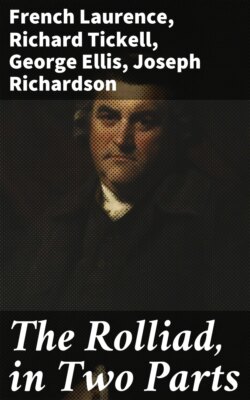Читать книгу The Rolliad, in Two Parts - George Ellis - Страница 10
На сайте Литреса книга снята с продажи.
NUMBER II.
ОглавлениеOur author, after giving an account of the immediate descendants of ROLLO, finds himself considerably embarrassed by the three unfortunate ROLLOS[1], whom history relates to have been hanged. From this difficulty, however, he relieves himself, by a contrivance equally new and arduous, viz. by versifying the bill of indictment, and inserting in it a flaw, by which they are saved from condemnation. But in the transactions of those early times, however dignified the phraseology, and enlivened by fancy, there is little to amaze and less to interest; let us hasten, therefore, to those characters about whom not to be solicitous, is to want curiosity, and whom not to admire, is to want gratitude—to those characters, in short, whose splendour illuminates the present House of Commons.
Of these, our author’s principal favourite appears to be that amiable[2] young Nobleman, whose Diary we have all perused with so much pleasure. Of him he says—
———Superior to abuse,
He nobly glories in the name of GOOSE;
Such Geese at Rome from the perfidious Gaul
Preserv’d the Treas’ry-Bench and Capitol, &c. &c.
In the description of Lord MAHON, our author departs a little from his wonted gravity—
———This Quixote of the Nation,
Beats his own Windmills in gesticulation,
To Strike, not please, his utmost force he bends, And all his sense is at his fingers ends, &c. &c.
But the most beautiful effort of our author’s genius (if we except only the character of Mr. ROLLE himself) is contained in the description of Mr. PITT.
Pert without fire, without experience sage,
Young with more art than SHELBURNE glean’d from age,
loo proud from pilfer’d greatness to descend,
Too humble not to call DUNDAS his friend,
In solemn dignity and sullen state,
This new Octavius rises to debate!
Mild and more mild he sees each placid row
Of Country Gentlemen with rapture glow;
He sees, convuls’d with sympathetic throbs,
Apprentice Peers, and deputy Nabobs!
Nor Rum Contractors think his speech too long,
While words, like treacle, trickle from his Tongue!
O Soul congenial to the Souls of ROLLES!
Whether you tax the luxury of Coals,
Or vote some necessary millions more,
To feed an Indian friend’s exhausted store,
Fain would I praise (if I like thee could praise)
Thy matchless virtues in congenial lays.
But, Ah! too weak, &c. &c.
This apology, however, is like the nolo episcopari of Bishops; for our author continues his panegyric during about one hundred and fifty lines more, after which he proceeds to a task (as he says) more congenial to his abilities, and paints
———in smooth confectionary style,
The simpering sadness of his MULGRAVE’s smile.
From the character of this nobleman we shall only select a part of one couplet, which tends to elucidate our author’s astonishing powers in imitative harmony,
———“within his lab’ring throat
The shrill shriek struggles with the harsh hoarse note.”
As we mean to excite, and not to satisfy at once the curiosity of our readers, we shall here put a period to our extracts for the present. We cannot, however, conclude this essay, without observing, that there are very few lines in the whole work which are at all inferior to those we have selected for the entertainment of our readers.
[1] See the Genealogy, p. xxvii, xxviii.
[2] Lord Graham.
* * * * *
